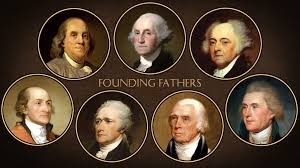It's high time for another guest blog and this one, by my sister Lucia Monfried, spotlights four of our revered founding fathers and is entitled PRESIDENT'S COMPOST
With presidential politics front of mind these days, I'm thinking of a certain president who was hot headed, prickly, and off-putting, one who distrusted the press, and felt himself constantly undercut by comparisons to his predecessor. No– it's not the current resident in the White House, but John Adams, our second president. Comparisons to current leader (ahem!) end there. Adams, who said "facts are stubborn things," was a courageous patriot and brilliant writer and thinker who got the revolutionary war going.
Defeated in the election of 1800 by Thomas Jefferson, his vice president, in a hotly contested and shockingly mean spirited fight, he did not attend the inauguration of his rival, instead slipping away to his farm before the festivities. Sound like someone we know?
I gleaned these facts from a wonderful book called Founding Gardeners by Andrea Wulf, about the estates, farms and gardens of our first four presidents.
As election tensions rose in the leadup to the recent election, I found a kindred spirit in Adams, who was reputed to go out "digging and scything" when he felt anxious as Washington's vice president.
 |
| Madison couldn't wait to don old patched trousers for gardening, while I wear sweatpants and old shoes today |
I indulged in some digging and raking (not scything) myself, in my garden in Connecticut, to ease my anxiety as events unfolded in November.
Adams was the only New Englander among the founders Washington, Jefferson and Madison, all rich Virginia estate owners. Adams had a farm in Quincy, Massachusetts, which he named Peace Field (now a part of the National Park Service and open to visitors in normal times) to which he retreated and lived out his very long life.
 |
| Peace Field in Quincy, MA |
Below, in contrast to John Adams's modest farm, are depictions of the grand Virginia estates of George Washington and Thomas Jefferson.
 |
| Extensive gardens and grounds of Mt. Vernon, George Washington's estate in Northern Virginia |
 |
| Monticello, Jefferson's luxurious estate in central Virginia- note extensive experimental 'vegetable terrace' to the right |
Adams eventually reconciled with his former friend Jefferson with whom he had spent time in England after the Revolutionary War carrying out governmental duties. They both toured gardens there, read treatises, and immersed themselves in the art and science of horticulture.
Both men believed deeply in an agrarian future for the young republic, and followed advances in agricultural research. Endearingly to me, Adams studied and revered compost. One scene in the HBO miniseries John Adams starring Paul Giamatti as Adams and Laura Linney as his wife Abagail, shows him in the muck extolling the merits of manure.
 |
| Promotional photo for HBO's John Adams |
 |
| A screen grab of young John Quincy Adams |
"Deeper! Deeper!"commands John Adams while he and his son dig in the compost in the HBO miniseries John Adams
Son John warily sniffs a handful of dung offered by his enthusiastic father in John Adams.
Adams may have been truculent and thin skinned but he reminds us that people are complex, a mix of attractive and unappealing characteristics. Another reminder: activities that were sustaining two centuries ago– digging and composting and improving the earth– continue to be so today. Working on his farm was so important to Adams that he compared it to a medicine.
So with this wish, take a cue from John (and James and George): May the conservation of the land so hallowed by our founding fathers sustain us all in this fractious time of transition.









